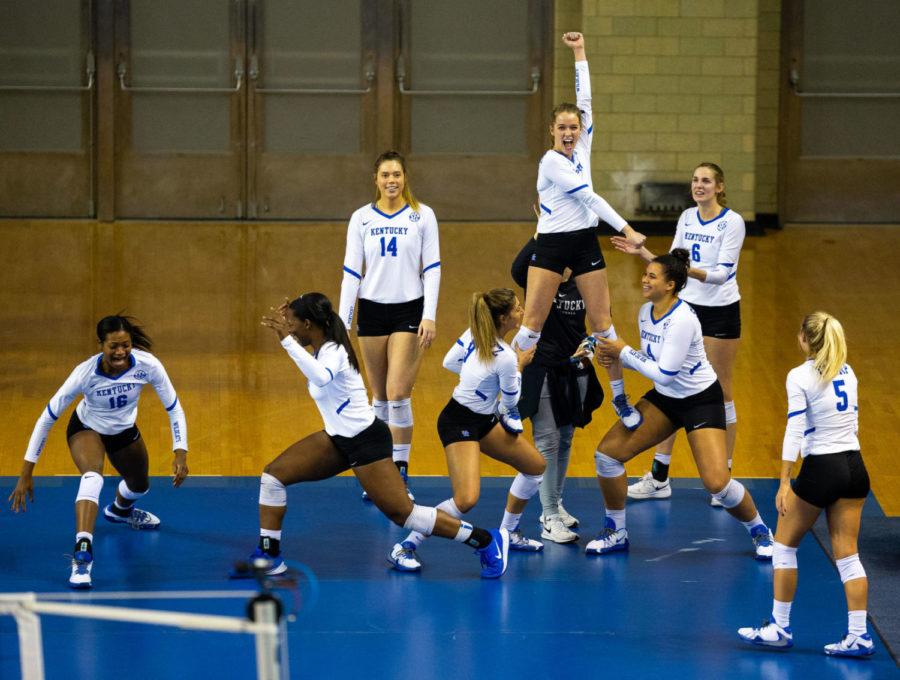Division I to attempt Fall Sport Championships in Spring; Allow Additional Eligibility
The Kentucky volleyball team celebrates a point during the second round game of the DI NCAA Volleyball Tournament against Michigan on Saturday, Dec. 7, 2019, at Memorial Coliseum in Lexington, Kentucky. Kentucky won 3-0. Photo by Jordan Prather | Staff
August 21, 2020
Fall sport athletes may get the opportunity to play for an NCAA title this season after all.
Over video conference earlier today, the Division I Board of Directors approved a number of recommendations from the Division I Council regarding fall championships.
The two biggest measures, as far as the sports themselves go, are:
– Working toward hosting scaled back fall championships in the spring
– A “blanket waiver” for ALL fall-sport athletes, granting them an additional year of eligibility and an additional year in which to complete that eligibility, regardless of if an athlete does or does not suit up in 2020.
In addition to those above, the board implemented many of the Council’s recommended protections for college athletes, including:
– Prohibiting schools from requiring athletes to waive legal rights concerning COVID-19 in order to participate in their 2020 season
– Prohibiting schools from reducing or canceling scholarships if an athlete in any sport chooses to opt out because of COVID-19
– Flexibility for athletes in their progress-toward degree requirements that are required to be met for future eligibility
– Not counting the financial aid of senior fall sport athletes who use their extra eligibility or additional year to complete it against team limits in 2021-2022.
Each of these protections are effective immediately.
“We want to provide opportunities for student-athletes whenever possible,” said Texas State president and acting board chair Denise Trauth in a press release. “It will be complicated and difficult, and we’re not certain of how it will look. But we believe it’s important to try and give students that championship experience.
NCAA President Mark Emmert announced last Thursday in Episode 21 of the NCAA Social Series that fall sport championships were postponed. The move came after 20 of the 32 conferences postponed their fall seasons due to ongoing COVID-19 concerns.
Board members made clear the priority is to “preserve opportunities for winter and spring sport student-athletes who did not have the chance to participate in NCAA Championships in 2019-2020.” The board also stated that fall championships only be played “if they can be conducted safely and in accordance with federal, state and local health guidelines.”
Final decisions on bracket sizes and composition for the fall championships, should they happen, will be approved by the board.
Affected sports at UK include volleyball, cross country, both men’s and women’s soccer. Football is also affected, but only from player eligibility and protection aspects.
The FBS football season and College Football Playoff, which are not NCAA-sponsored, are unaffected. As of now, three of the Power Five conferences (SEC, ACC and Big-12), as well as the AAC, Sun Belt and Conference USA are scheduled to put on the pads near the end of September.
For all other fall sport athletes, the announcement keeps hope of a semi-regular chance to compete for a national title this season. With the choice of additional eligibility, some players may actually get an extra opportunity to chase their sport’s biggest trophy if this year’s championships happen. In this era of uncertainty, it seems there’s not a whole lot more one could ask for.
































































































































































